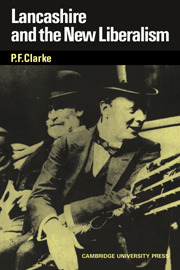Book contents
- Frontmatter
- Contents
- Preface
- Abbreviations
- Dedication
- PART ONE INTRODUCTION
- PART TWO FORMATIVE INFLUENCES
- PART THREE THE TERMS OF THE CONTEST
- PART FOUR THE RECONSTITUTION OF LIBERAL LANCASHIRE
- PART FIVE FIELDS OF RECRUITMENT
- 10 Communal politics
- 11 The rise and fall of the Free Traders
- 12 Labour
- PART SIX GOING TO THE COUNTRY
- PART SEVEN CONCLUSION
- APPENDICES
- Bibliography
- Index
10 - Communal politics
Published online by Cambridge University Press: 23 November 2009
- Frontmatter
- Contents
- Preface
- Abbreviations
- Dedication
- PART ONE INTRODUCTION
- PART TWO FORMATIVE INFLUENCES
- PART THREE THE TERMS OF THE CONTEST
- PART FOUR THE RECONSTITUTION OF LIBERAL LANCASHIRE
- PART FIVE FIELDS OF RECRUITMENT
- 10 Communal politics
- 11 The rise and fall of the Free Traders
- 12 Labour
- PART SIX GOING TO THE COUNTRY
- PART SEVEN CONCLUSION
- APPENDICES
- Bibliography
- Index
Summary
I bewilder so many people by not being ‘party’; I directly offend so many more by refusing to have anything to do with teetotalism, vegetarianism, suffragism, Buddhism, and Scientific Monism, that whole belts of people who voted for me last time will vote against me this time.
Hilaire Belloc, 1909The activities of pressure groups were necessarily influenced by calculations as to ends and means; the behaviour of the communities for whom they spoke, on the other hand, was governed by subjective feelings of affinity. It was the function of a pressure group to articulate this common outlook in political terms. The social relationships arising from the structure of landed society are clearly of a distinct character, in which the role of authority can hardly be ignored. Yet, certainly after 1885, the political power of the landed interest, like that of the quasi-religious groups, was essentially dependent upon a community of sentiment, however induced. ‘As things are in the Knutsford division’, admitted the Guardian, ‘it is difficult for any Liberal to persuade the electors that their interests do not necessarily coincide with those of the landowner whose tenants they happen to be, or those of the farmers in whose employment they are.’ This was more a matter of the labourer's consciousness than of the landowner's sanctions.
In Lancashire itself old landowning families were most important in the belt of county divisions running from North Lonsdale through Blackpool and Chorley to Ormskirk; this influence shaded off in the surrounding mining divisions of Westhoughton, Newton and Ince.
- Type
- Chapter
- Information
- Lancashire and the New Liberalism , pp. 249 - 273Publisher: Cambridge University PressPrint publication year: 1971



